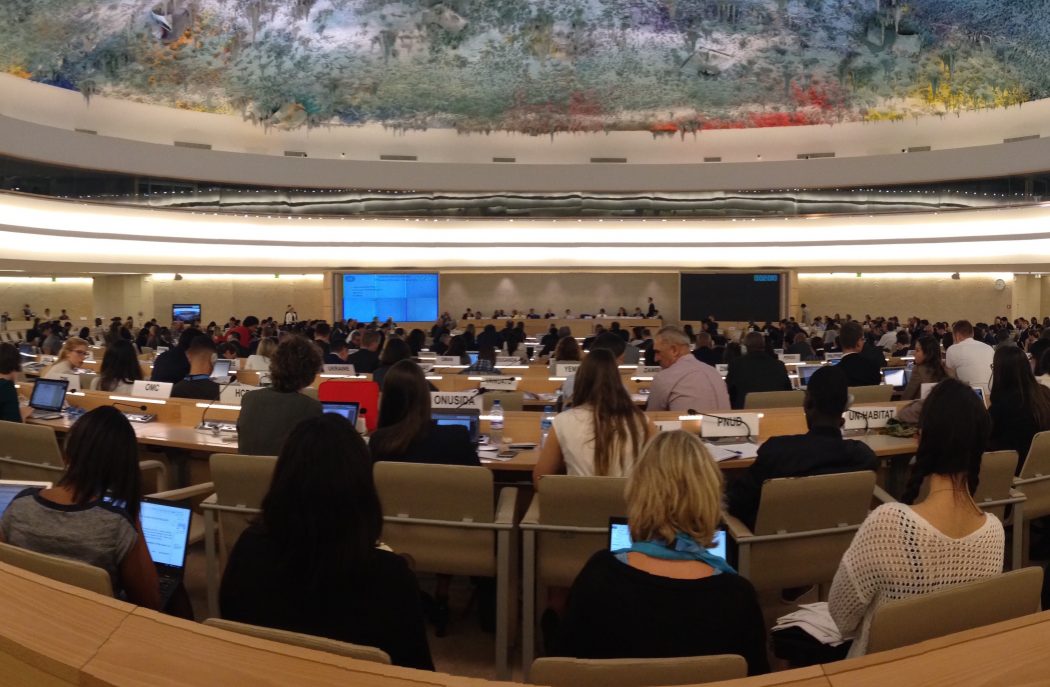Egypt, Saudi Arabia, Cuba, Venezuela, and Burundi. If you saw those nations together, what list would you think it was from? If you guessed members of the UN Human Rights Council, you’d be correct! But was that close to your first guess?
One would think that a basic regard for human dignity would be a prerequisite for entry onto the Human Rights Council (UNHRC), evidently this is not the case. And yet a laughable 26 out of the 47 member states have been categorized as human rights violators by the American human rights watchdog Freedom House. Since 2009, there has been only one instance in which over 50 percent of the members were not human rights abusers.
The deplorable human rights track record within the council is a direct result of the process by which countries obtain seats. States are voted in by secret ballot in the General Assembly, and a simple majority vote is needed to secure a seat. There are no other qualifiers for entry, and even countries that have been sanctioned by the Security Council are eligible. To make matters worse, the hidden nature of the vote encourages states to engage in backdoor negotiations to exchange and secure votes. This type of political wheeling and dealing was exposed in 2013 when WikiLeaks shared documents showing that Saudi Arabia and the United Kingdom agreed to exchange votes prior to an election.
The bloc voting system established at the time of the council’s founding is an additional cause for its tendency to allow dictatorships to participate. To encourage geographic diversity, it was mandated that the council be composed of regional blocs, 13 seats from Asia, 13 from Africa and so on. This structure severely limits the capability of the General Assembly to vote based on human rights criteria. Even more ludicrous is the common practice of regional blocs to submit as candidates the exact number of states needed to fill their quota, effectively rendering the General Assembly election as impactful as a Model U.N. vote.
The solution to the hypocrisy of the Human Rights Council is not particularly complex. It takes a bloated bureaucratic mess like the UN to allow a wound such as this to fester for over ten years. The first step is to remove the bloc voting system. Geographic diversity is a noble cause within the UNHRC, but not when it comes at the expense of the primary directive of the council. Autocracies from different parts of the world are still autocracies.
The next stage is to implement the initial barriers of entry that the US suggested in 2006, at the time of the council’s founding. The Bush administration proposed that no country currently sanctioned by the Security Council be allowed a seat. The Americans also required that nations receive a two-thirds majority in the General Assembly to be voted into the UNHRC. The restrictions were rejected by the rest of the UN. Based on the number of tyrants that have called the council home since its founding, this has proven to be a terrible mistake.
Putting the measures into effect now would have a dual effect. Restricting membership based on Security Council sanctions would prevent known human rights abusers from sitting on the UNHRC. Having a higher majority vote requirement would also make it more difficult for unsavory states to buy enough votes to gain election. I believe it would also be prudent to make voting public, thereby forcing each nation to justify their voting patterns to the rest of the international community.
In his recent speech at the UN, the U.S. President chastised the UN for the embarrassing oxymoron that is the United Nations Human Rights Council. In this instance, other world leaders should follow his example and pressure the UN to act. If they don’t, it seems as though countries like Saudi Arabia will be leading the global human rights crusade. But hey, women are allowed to drive there now! Who knows what will come next.





Although everyone can see the circus that the Council has become, most of the solutions suggested in this article are utterly ridiculous:
Making the eligibility in the HR Council conditional to being clear from Security Council sanctions? I remind you that the Security Council is itself undemocratic and increasingly seen as illegitimate because of the political use of vetos, notably by the Americans. If anything, we must seek to reduce the role of Security Council in all UN decisions. And we all know why the US wants the SC to have the right to filter the candidates, and how they will use it.
Public voting is also a very bad suggestion, as it is in most elections. It will only saw deeper divisions and increased abstention. While it may cut on some backroom deals, it will at the same time increase the probability of certain regional or global powers pressuring/blackmailing the others into compliance. Not very democratic, mind you.
Removing the regional quotas is yet another terrible suggestion. Guess who will be elected to the council every year then? Guess which continents will always take a larger share, and which ones always a smaller one. It is not very difficult to imagine, make an effort. But of course that is a great thing if you think The West is the only one who has an opinion about human rights…
The only suggestion that seems to hold is to raise the vote requirements. I would add to that making it mandatory for each region to present more than enough candidate to allow choice.
Let’s be clear: The Americans, and notably Bush administration, weren’t and aren’t interested in fixing the HR Council per se. Bush’s ambassador to the UN (Bolton) was and remains the biggest proponent and defender of every kind of human rights abuse committed by his own country (including in Abu Ghuraib and Guantanamo). The Americans are only interested in killing the voice of dissent in the Council, and they only remember it is a shamble when they are criticized.
And by the way, I wouldn’t call the UN a “bloated bureaucratic mess”. At least not as long as there are such prime examples of non-working bureaucratic bloats such as the US Senate!